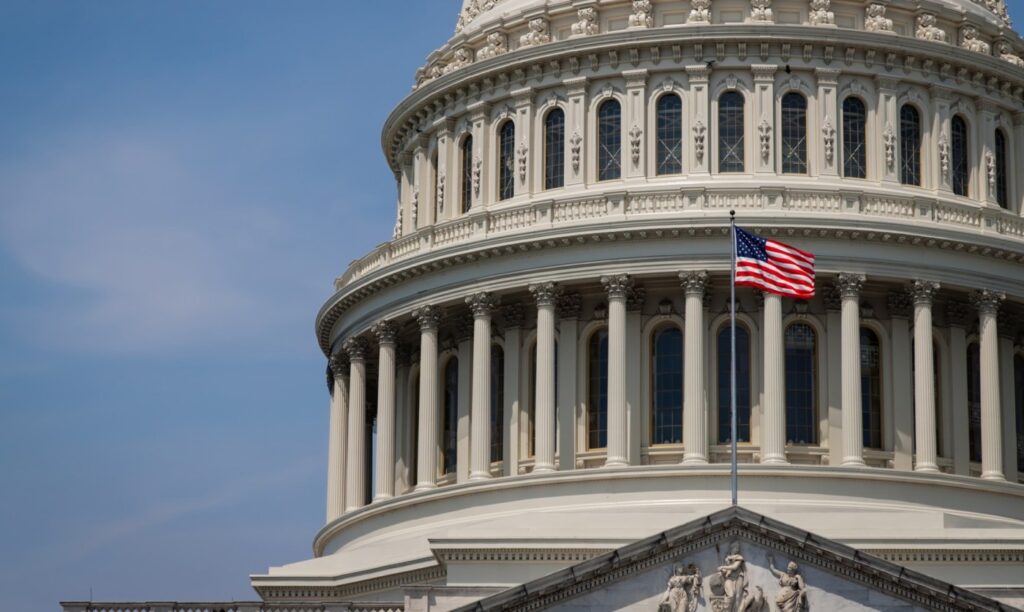
There is no right of privacy in the U.S. Constitution, at least there wasn’t until 1965, when the Supreme Court famously found one in “penumbras, formed by emanations” from the Bill of Rights. It wasn’t a unanimous decision. “With all deference, I can find no such general right of privacy in the Bill of Rights, in any other part of the Constitution, or in any case ever before decided by this Court,” wrote one of the dissenting justices.
However, there is an explicit right to be free from uncontrolled government searches. It’s the Fourth Amendment:
“The right of the people to be secure in their persons, houses, papers, and effects, against unreasonable searches and seizures, shall not be violated, and no warrants shall issue, but upon probable cause, supported by oath or affirmation, and particularly describing the place to be searched, and the persons or things to be seized.”
On Dec. 6, a report on financial surveillance in the United States was released by the House Judiciary Committee and the Select Subcommittee on the Weaponization of the Federal Government. It reveals that the U.S. government has turned the 1970 Bank Secrecy Act, a law intended to stop money laundering, tax evasion and criminal activity, into a tool to break through the Fourth Amendment and search the lawful, private financial transactions of innocent Americans.
According to the testimony of an FBI analyst, the Bureau considers financial institutions to be “partners.” It employed liaisons to reach out and “engage” them.
That sounds a lot like the government’s “engagement” with social media platforms, its “partners” in the silencing of Americans who “spread misinformation” as the government defined or declared it.
In both cases, the government coaxed or coerced its “partners” into doing what would be flatly illegal for the government to do itself.
“All the operational divisions, they all have an element that has an engagement responsibility with the private sector and partnerships in general,” explained FBI “Financial Targeting” analyst Peter Sullivan in a transcribed interview, “It’s one of Director Wray’s pillars, his partnerships.”
That would be FBI Director Christopher Wray, who just resigned.
Here’s how the “partnership” worked with Bank of America a week after the events at the U.S Capitol on Jan. 6, 2021. Sullivan told bank contacts in a “brainstorming” email that they might want to file a Suspicious Activity Report listing all of the bank’s customers who had used a credit or debit card in the Washington, D.C. area on Jan. 5 or 6, had made a weapons purchase of any kind in the last six month, and had a travel reservation to come to Washington on Jan. 19 or 20, when the inauguration would be held.
Without a warrant or any legal process, Bank of America sent the government a Suspicious Activity Report naming 211 customers who met those three conditions.
Sullivan, whose title at the time was finance sector liaison and who testified that his role was limited to “terrorism,” took that list of 211 bank customers and identified four individuals who had made a “weapons-related transaction” after Jan. 6.
Sullivan testified, “I remember going to my supervisor and saying, we should push out these four, do baseline queries of these four, which are basic criminal background queries, and push out via assessment — it’s called a Guardian. A Guardian is a no-stone-unturned assessment. It’s not an investigation. But we pushed those four Guardians out to three field offices, respectively.”
The three field offices were Memphis, San Francisco and Tampa. Then the four “Guardians” were uploaded for the Washington Field Office, which “had a number of leads that were sent.”
If you can’t already see it, let’s carefully go over what’s wrong with this.
THEY CAN’T DO THAT TO AMERICANS.
The government can’t “suggest” to federally regulated companies that they turn over lists of perfectly lawful customer transactions, then use the lists to imagine criminal plots, then send agents to knock on doors around the country to assess who might be a “domestic terrorist.”
We have gone off the constitutional rails.
“The FBI has manipulated the Suspicious Activity Report (SAR) filing process to treat financial institutions as de facto arms of law enforcement, issuing ‘requests,’ without legal process, that amount to demands for information related to certain persons or activities it considers ‘suspicious,’” the House committee reported.
The 1970 Bank Secrecy Act requires financial institutions to file a Suspicious Activity Report whenever the financial institution itself identifies “a suspicious transaction relevant to a possible violation of law or regulation.” Banks must also file a Currency Transaction Report with the federal government whenever any person conducts a transaction or multiple transactions totaling $10,000 in a single day.
Currency Transaction Reports have “proliferated exponentially” as well. According to the House report, “If a consumer purchased a car, furniture, jewelry, art, or made a tuition payment totaling more than $10,000, a CTR was likely filed containing the consumer’s information despite there being no evidence of any suspicious activity.”
Who can see these reports? Tens of thousands of government employees in “472 federal, state and local law enforcement, regulatory and national security agencies.” In 2023 alone, the reports were searched 3,362,735 times. Without a warrant.
The Judiciary Committee and Select Subcommittee also discovered that the federal government is “testing out new methods and new technology to continue the financial surveillance of Americans.”
The Fourth Amendment should be enough to stop this. Call your representatives and read it to them.
Write Susan@SusanShelley.com and follow her on X @Susan_Shelley
